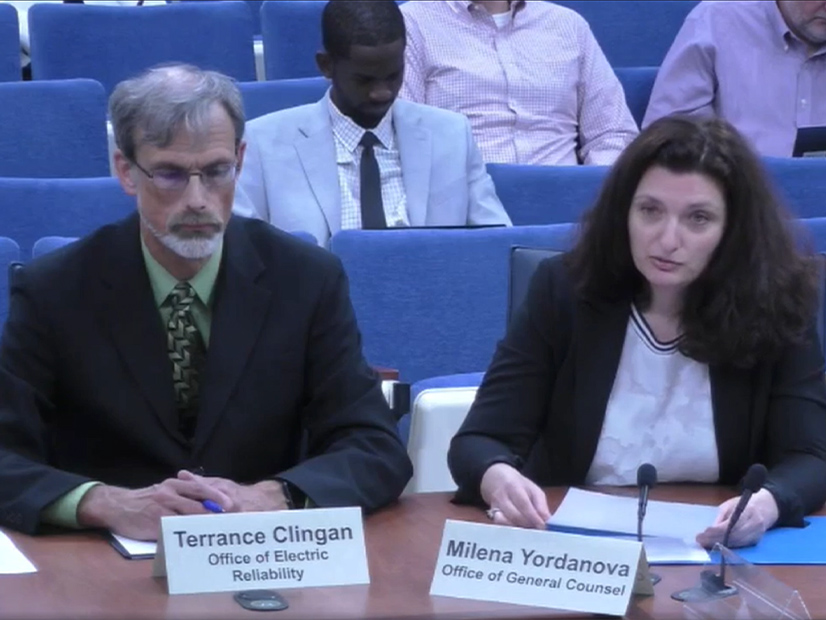Citing the “challenges that are growing every day” from climate change-induced severe weather, FERC on Thursday approved two draft Notices of Proposed Rulemaking intended to improve the long-term reliability of the bulk power system.
Because both measures relate to severe weather risks, FERC staff presented the NOPRs together at the commission’s open meeting. One proposes to direct NERC to modify reliability standard TPL-001-5.1 (Transmission system planning performance requirements) to set expectations for long-term planning by utilities (RM22-10).
Under the proposal, responsible entities would be required to:
- develop benchmark planning cases based on historical extreme heat and cold weather events and future meteorological projections;
- use steady state and transient stability analyses, covering a range of factors such as the grid’s changing resource mix and its performance during extreme weather, to plan for future extreme events; and
- create a corrective action plan to mitigate any occasions where performance requirements for severe weather have not been met.
Tech Conference Spurs Standards Effort
The proposal grew out of a technical conference FERC held last year on climate change and severe weather and their impacts on the electric grid, according to Milena Yordanova from FERC’s office of the general counsel, who presented the NOPR during FERC’s open meeting on Thursday. (See FERC Tackles Grid Planning for an Unpredictable Climate.)
“Since 2011, the country has experienced at least seven major extreme heat and cold weather events, all of which stressed the bulk power system and resulted in some degree of load shed. In some cases, these events nearly caused system collapse and uncontrolled blackouts, which were only avoided by the actions of system operators,” Yordanova said. In particular, she pointed to the winter storms of February 2021, when the Texas power grid came close to total collapse amid record cold temperatures. (See ERCOT: Grid was ‘Seconds and Minutes’ from Total Collapse.)
Yordanova said the NOPR focused on TPL-001 because it already establishes requirements for utilities to plan to operate the grid under “a broad spectrum of system conditions and following a wide range of probable contingencies”; however, the standard does not currently include any specific measures relating to extreme weather. It also does not have any provisions requiring the development of corrective action plans, although it does provide for utilities to “evaluate possible actions to reduce the likelihood or mitigate the consequences of extreme events.”
Transmission Providers Need Climate Plans
The other NOPR introduced on Thursday, also inspired by last year’s technical conference, proposes to solicit one-time reports from transmission providers detailing their “current or planned policies and processes for conducting extreme weather vulnerability assessments and mitigating identified extreme weather risks” (RM22-16, AD21-13).
Presenting the NOPR, Alyssa Meyer of FERC’s Office of Energy Policy and Innovation said participants in the conference expressed “widespread agreement” that utilities and other bulk power system stakeholders should assess their vulnerability to extreme weather risks. However, while some transmission providers do conduct such assessments voluntarily, there is no industry-wide requirement that they do so.
Meyer emphasized that the NOPR is not meant to impose any new requirements on utilities that already conduct their own assessments, and that transmission providers that do not will only be required to do so once. The proposal does require transmission providers to submit a one-time report to FERC detailing how they:
- establish the scope of their vulnerability assessments;
- develop inputs;
- identify vulnerabilities and determine exposure to extreme weather hazards;
- estimate the cost of weather impacts; and
- develop mitigation measures to address extreme weather risks.
While both items passed without objection, the discussion at Thursday’s meeting once more brought to light some philosophical differences between the commissioners. Notably, Commissioner James Danly warned that the commission should focus not only on the growing climate risks, but also on policies at the state and local level that he believes push the BES into a more vulnerable position.
“My belief is that there is a growing narrative that places the weather itself at the center of the reliability problems we’re facing, and when we look at the dire warnings we have of thinning capacity, margins and shortfalls, those are not driven by the weather,” Danly said. “When you reduce the amount of capacity you have, when you have market systems that create bad price signals that fail to properly incentivize the correct entry, exit and retention of the resources needed to keep the system running … then you are more vulnerable to any disruption, weather included.”
Asked about Danly’s comments in a press conference after the meeting, FERC Chair Richard Glick expressed strong disagreement, saying the commission can only act within the framework established by the Federal Power Act and has no legitimate role to play in influencing government policy decisions.
“FERC’s role is to take the situation as it is, react to it and ensure, to the greatest extent possible, that rules are in place to ensure grid reliability,” Glick said. “I think that this whole notion that we should sit here from FERC and tell the states they got it wrong is ridiculous. That’s not our role, and if you’re a strict constructionist, you would agree with that. Commissioner Danly calls himself a strict constructionist quite frequently, but if you look at the Federal Power Act, it’s very clear.”
Comments on both NOPRs are due 60 days after their publication in the Federal Register.




